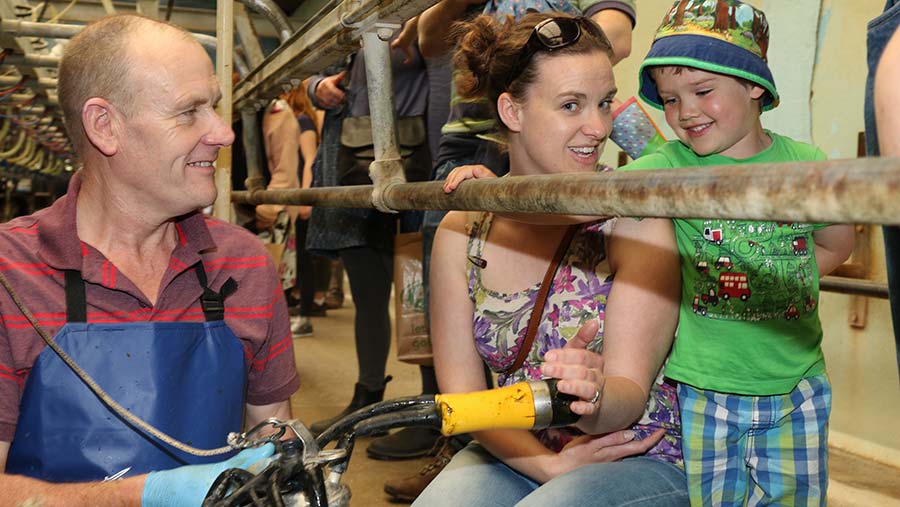Opinion: Here’s why we need youngsters to engage with farming
 © LEAF Open Farm Sunday
© LEAF Open Farm Sunday A recent conversation with my teenage son got me thinking. He was challenging me about the need to visit (yet another) farm as part of a family holiday. “Why do I need to go?” he protested and then returned to his iPad.
So why do we want our young people to know more about farming, how their food is produced and where it comes from?
We don’t expect that same level of engagement in how cars are manufactured or the intimate workings of a computer – both of which are part of our daily lives, just as food is.
See also: 5 alternative ways to hold an Open Farm Sunday event
Our relationship with food has changed so much since I was a teenager when almost every meal was eaten as a family around the dining table.
Today, one in five families eat meals together only two or three times a week. UK consumers buy more ready-made meals than any other major European country. We live busy lives.

Annabel Shackleton is Leaf’s Open Farm Sunday manager
Living in an instant world
Young people are more connected than ever. They live in a world of instant messaging, raised in an era that has given them instant access to a wealth of information.
They can get their voice heard on millions of different platforms and websites every day.
My son may live in an instant world, but I want him to understand the seasons; to understand that food production takes many months, involving a huge range of skills and technologies.
I want him to appreciate that when we spend time in the countryside, he is in an environment managed by farmers. That sustainable farming is about managing our natural resources for future generations.
The rich experience of spending time on a farm engaging all the senses provides a learning experience second to none.
It also helps to address a number of pressing issues facing young people today – rising obesity levels, increasing issues around mental health and wellbeing and continued disengagement from the natural world around them.
Many teenagers prefer to communicate electronically rather than face to face. But it is these face-to-face experiences that matter.
Providing these opportunities for meaningful interaction with food producers, out on farm, that is at the heart of a number of industry initiatives – Open Farm Sunday, FaceTime a Farmer, The Royal Highland Education Trust’s school visits, to name a few.
They all seek to transform the way we engage with young people, to understand the challenges they face, to learn what inspires them, to listen to their views, feelings and beliefs around farming and rural issues.
All united in their desire to connect young people with farming and make it relevant to their lives.
Health and wellbeing
Last year, Leaf (Linking Environment and Farming) Education led a pioneering research programme with teenagers to learn about the issues that matter most to them, gain fresh perspectives and to involve them directly in developing strategies to help transform the way the agricultural sector communicates with them and, crucially, addresses their needs and concerns.
Forty-one percent of those involved strongly agreed that young people should be more interested in how food is produced and where food comes from; 35% said they would consider a career in food and farming.
Engaging young people in farming and food production is vital to the future of the agricultural industry as well as for their own health and wellbeing.
Strengthening that connection can help promote healthier lifestyles, drive demand for British produce and nurture a lifelong interest in the natural world, helping to build a sense of their own personal responsibility in protecting it.
It all starts with a visit to a farm. I’ll remember this when I’m next challenged by my son.
Annabel Shackleton is Leaf’s Open Farm Sunday Manager. Open Farm Sunday is on 9 June 2019. For more information and to register to open your farm go to the Leaf website.

